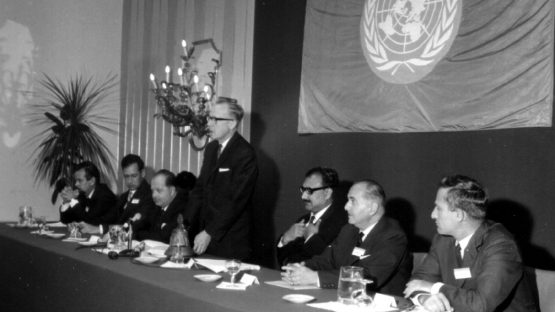The Abdus Salam International Centre for Theoretical Physics (ICTP) is built in part on a foundation of collaboration - literally and figuratively. Sealed in the cornerstone of the Centre's main building is a parchment of the official agreement establishing the Centre. Preserved on this agreement is the autograph of former IAEA Director General, Sigvard Eklund, who served from 1961 until 1982. This document exhibition reflects not only a part of the literal foundation of the ICTP, but also a figurative link between the ICTP and IAEA, which is a collaboration in nuclear science and research that has unfolded over the decades into a rich and intertwined relationship between the two institutions.
This relationship is among the many highlights of the ICTP's 50th Anniversary commemorative event from 6 to 9 October 2014 in Trieste, Italy. The celebrations will also feature glimpses into the Centre's five decades of work in physical and mathematical sciences and emphasize its collaborations with its governing bodies: the IAEA, UNESCO and the Government of Italy.
In his welcoming remarks during the opening day of the event, IAEA Director General Yukiya Amano acknowledged the Agency and ICTP's close ties and said, "The IAEA and ICTP are natural partners. The ICTP's theoretical work helps to underpin the practical day-to-day activities of the IAEA. We greatly value our association with the Centre, which goes right back to the beginning, and with our partners UNESCO and the Government of Italy."
The ICTP is an institute run by scientists for scientists. The Centre serves as a forum for knowledge exchanges and to foster the growth of studies and research in physical and mathematical sciences, especially in developing countries.
"The ICTP was originally part of the IAEA," said Director General Amano. He explained that UNESCO took on the administration of ICTP in the 1990s, but the IAEA has remained "an important contributor to the ICTP budget, and we work together in many areas, including training and nuclear knowledge management." He continued on to outline the many fields influenced by nuclear science and technology, including human health, food security, agriculture, energy and industrial applications.
"All of this technology originated from basic theoretical research, which may have begun many years earlier," said the Director General. "It is fascinating for me to see how ideas that originated in the minds of brilliant scientists, brought together by organizations such as the ICTP, can have a real and lasting impact in the lives of ordinary people around the world."
A Look Back
Tracing back to the establishment of the ICTP, it was in 1960 at the IAEA's Fourth General Conference that a 34-year-old physicist from Pakistan, future Nobel laureate, Abdus Salam, suggested the founding of an international theoretical physics institute. Salam's association with Sigvard Eklund began when they previously met at an IAEA Conference. Eklund was later instrumental in securing the IAEA's support for the Centre.
Two years later, the IAEA hosted an international seminar on theoretical physics in Trieste, Italy to gauge the interest in promoting such a centre. The conference was a success for both the IAEA and the city. "The event holds such importance for the city that the Mayor of Trieste welcomes the participants to Town Hall," the IAEA wrote in a commemorative caption. In 1963, the General Conference of the IAEA signed an agreement with the Italian Government to establish the ICTP in Trieste.
In the early years of the ICTP, the IAEA's involvement shaped the Centre in numerous ways: contributing US $55 000 to the original ICTP budget; defining the original research focus of nuclear, plasma, and elementary particle physics; and providing staff and running the administration of the Centre until the mid-1990s. Although ICTP is now administered by UNESCO, the IAEA continues to be deeply involved in the Centre's programmes being offered globally.
In 2002, the ICTP and IAEA created the Sandwich Training Educational Programme (STEP), which provides fellowships to doctoral students from developing countries studying scientific challenges of particular interest to both the ICTP and the IAEA. On the occasion of ICTP's "After 45" celebrations, the former IAEA Deputy Director General and Head of the Technical Cooperation Department, Ana Maria Cetto, praised ICTP's role in the joint collaboration: "The training and networking opportunities that ICTP provides to STEP fellows plays an essential role, not only in building scientific capacity in individuals, but also in bridging the gap between science and the application of science for national socio-economic development."
The Present and the Future
STEP is one of many ongoing joint projects of the IAEA and ICTP. Others include the Synchrotron-Light for Experimental Science and Applications in the Middle East (SESAME) programme, which enables scientists from the Middle East to train at European laboratories, and the annual ICTP-IAEA International School on Nuclear Security that provides professionals from developing countries with the fundamental nuclear security knowledge needed to understand international requirements as well as the measures to be taken to meet obligations under the international nuclear security legal framework.
Perhaps the most obvious enduring legacy of ICTP and IAEA's half century of collaboration is the number of joint workshops and scientific events hosted at ICTP and elsewhere. Recently, these have included a Workshop on Nuclear Reaction Data for Nuclear Power Applications; the 10th School of Nuclear Knowledge Management; and a College on Advanced Plasma Physics. Up next is a Conference on Models and Data for Plasma-Material Interaction in Fusion Devices this November. There are also 11 joint activities on the ICTP scientific calendar for 2015, ensuring that the IAEA and ICTP's historic ties - and their commitment to "Atoms for Peace" - will be further strengthened in the future.
For more details about ICTP's anniversary celebrations, please visit their website.


